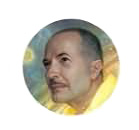When first asked to be part of this blogging effort, I was overjoyed. Just as when I was asked to write an afterword for the Puppet Masters edition from Baen Books, I felt honored beyond my deserts and humbled at the same time. For the little kid who read Heinlein books in Portuguese translation and for whom writers were sort of gods in a distant overseas Olympus, this was an unimaginable elevation.
I was on a trip when the invitation came and when I returned and found the bound galley of Patterson’s first volume waiting for me, something funny happened. I couldn’t read it. I tried. One page or two and I’d stop cold and find something incredibly interesting to do, like cleaning cat boxes.
It wasn’t anything about Patterson’s writing, which manages the difficult feat of being perfectly factual and yet lyrical and inspiring. It was the subject.
It linked in my mind with the memory of being three years old and being sent by mom to call dad to lunch. Dad was in the bedroom and he was changing from his suit into his weekend clothes. We lived in a shotgun apartment cut out of my grandmother’s larger house, so there was no door to open, only a curtain a small child could—unthinkingly—pull aside. And I did. And I got a glimpse of my dad, naked, from the back. I closed the curtain immediately, withdrew, shaking, and have never spoken of it till now. The memory of that shock remains sick-making.
It wasn’t nudity taboo. To be honest, I think I was too young to have any idea about that. I grew up in a more innocent age when no one warned toddlers of sexual dangers and possibilities. It was the terrible, earth-shattering revelation that daddy was human: that he was made of flesh and skin, like the rest of us. Until that moment, to me, he had been a suave figure clad—because he had a white-collar job—in far more elegant clothes than our farmer and craftsmen neighbors. In that moment, I saw behind the light that obscured the sight of Jove, and knew that the all-powerful figure was not: he was human like me. For a while, the world rocked on its foundations.
A similar—religious?—fear kept me from reading the first volume of Heinlein’s bio for a week or so. But once I did start, I found I couldn’t stop devouring the entire thing, introduction to appendix, not forgetting the footnotes, in two days before I started again, more slowly, making notes and marking pages. Part of it is William Patterson’s writing, which manages to show Heinlein’s life in an unsparing light that is yet kind and understanding. The other part is…
Well, I am no longer three years old. Yes, finding out daddy—and in the sense of forming my thinking and my attitudes towards the world, Heinlein was as much my daddy as my real father is—is human is still a shock. One knows it at some level, but it’s hardly pleasant to have one’s nose rubbed in it.
On the other hand in my middle years, having raised two boys almost to the age of reason and having seen countless friends grow up or fail to, I’ve grown past the callow inability to tolerate human frailty. I don’t demand that my heros be born flawless. On the contrary. Hearing about their struggles makes them more admirable. And more human.
Do I disagree with a lot of things Heinlein did and believed at some time or another? Of course I do. The repulsion is directly proportional to the degree to which I did or believed the same things. But it doesn’t matter. Those are only a part of the whole and don’t deter from it.
Reading Patterson’s work was like sitting at the feet of a beloved parent while he reminisces about his childhood and youth. More, it was like sitting at the feet of a beloved parent talking about this time of his life in the same village in which I grew up.
I don’t mean that literally—though I did grow up in a Portuguese village—I mean that Heinlein’s bio talks about the field I grew up to become a member of. There were mentions of many other people I read and loved, and even mentions of people I’ve heard about from some of my current colleagues. Lots of moments of sudden epiphany of “Oh, so that’s why….”
I will be blogging about my revelations (which might be old hat for anyone else) and also about those bits of Heinlein’s bio that struck me as particularly interesting and connected to his work.
The experience of reading this first volume of Heinlein’s bio, as a whole, was much like going home—at least for me—where you might find you’re locked in an incredibly nasty political or religious argument with your father, but then the soup is served, and the talk turns to other things and you realize the love is still there, untouched by all the arguments, and daddy might not be a god, but he’s still your hero, and you agree about all the important things, like personal honor and the duty to strive. And you’re home again.
Hopefully I’ll be able to share my own personal… Learning Curve with the readers.
Sarah A. Hoyt‘s many novels include urban fantasy such as Draw One In the Dark,, Shakespearean fantasy such as Ill Met by Moonlight, historical mystery such as The Musketeer’s Seamstress (under the byline Sarah d’Almeida), and alternate-world fantasy such as Heart of Light. Born in Portugal and raised speaking both English and Portugese, she also speaks Swedish, Italian, and French. A US citizen since 1988, she lives in Colorado.










